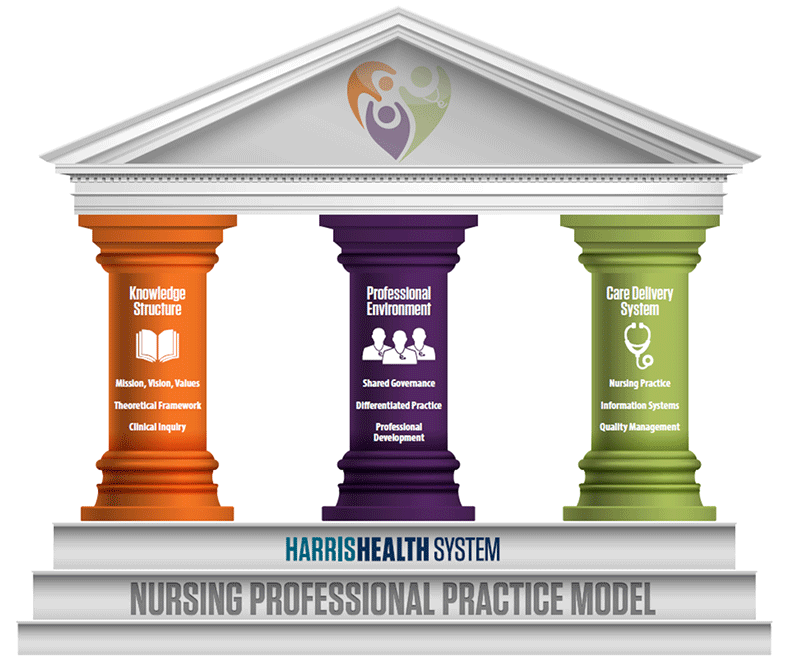
Domain II is the Professional Environment. As professional nurses, we have the autonomy and voice to control, develop and practice to our highest level possible through each of the components.
Inherent in this domain is professional enculturation—nurses coming together as a group and learning about their professional practice. At Harris Health, it means nurses have adopted a set of values, and these values are reflected in our practice and behavior.
Purple represents power, wisdom, dignity and independence.
The Professional Environment Domain includes three components that incorporates structures and systems that address all characteristics of a professional nursing practice environment:
- Shared Governance
- Differentiated Practice
- Professional Development
Shared Governance
Shared governance enables sustainable and accountability-based decisions to support an interprofessional design for exemplary patient care. The Nursing Shared Governance Model established Communities of Practice (CoP) throughout all clinical nursing areas. This initiative created a shift in the organization from a hierarchal decision structure to one in which direct-care professional nurses have authority and accountability for voicing decisions within their practice communities.
Differentiated Practice
Nurses perform at different levels of practice based on their knowledge and experience in a specific clinical setting. The Nursing Clinical Advancement Program (NCAP) is designed to acknowledge and reward RNs for their achieved level of practice. The achieved level of practice (nurse clinician I to V) is used as the foundation for performance standards, professional recognition and compensation policies.
Practice levels are differentiated in accordance with Benner’s theoretical framework which specifies the incremental development of competencies in five stages of development from novice to expert. These practice levels are based on education, specialty certification and assessed clinical judgment patterns. The eight nurse competencies delineated by the
AACN's Synergy Model are used as the basis for evaluating competency demonstrated through submission of a written portfolio.
Professional Development
Professional development is key to effective implementation of the NPPM. In addition, the NPPM is the driver for a number of strategic changes in all professional development programs. In particular, operationalization of the NPPM requires a competent nursing staff that is challenged to advance in knowledge and skills. Harris Health Nursing adopted the Institute of Medicine’s definition of professional competence: the habitual and judicial use of communication, knowledge, technical skills, clinical reasoning, emotions, values, and reflection in daily practice for the benefit of the individuals and community being served. Examples of Harris Health’s professional development offerings include onboarding and nurse residency programs, nursing continuing professional development and formal educational support and development. Courses on preceptor training, charge nurse and leadership development are available for emerging leaders. Developmental activities are also offered to leaders participating in the nurse succession program.